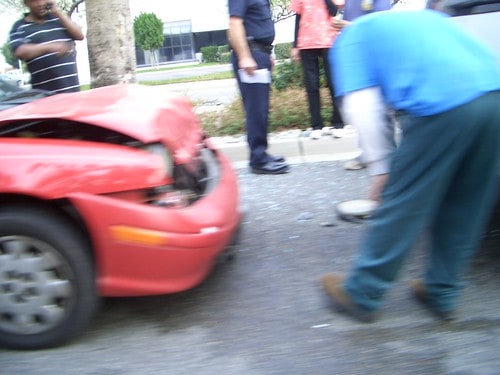Insurance basics: How car insurance works
This is the third part in a short series about insurance basics. In the first part, I explained how insurance works. In the second, I shared some general tips about how to save on insurance of all types. Today’s article offers info about auto insurance.

Liability Insurance
In most states, you at least need to have liability insurance, which covers the cost of any damage you do to other people or things with your car. (But note that liability insurance doesn’t cover injuries to you or other people on your policy; for that, you need PIP insurance, which I’ll cover in a moment.)
Insurance companies like to quote liability coverage as a series of three numbers, like 50/200/25. If that’s Greek to you, here’s a break-down:
- The first number is how much, in thousands of dollars, the policy will pay for each person (besides you) injured in an accident ($50,000 in this example).
- The second number is the total that the policy covers for each accident ($200,000 here).
- And the last number tells how much property damage will be reimbursed ($25,000 in this case).
But there’s more to auto insurance than just liability coverage.
Collision and Comprehensive Insurance
As you can probably guess, collision insurance covers damage to your car when it hits (or gets hit by) another vehicle or object. But because collisions aren’t the only way for your car to get banged up, comprehensive insurance covers damage from events other than collisions: floods, fire, theft, alien invasion, and so on.
Collision and comprehensive coverage make more sense for newer vehicles, and are generally required if you’re still making payments on your car. They’re less necessary — and may actually be a waste of money! — on older cars. So, if you’re still driving around that 1970 AMC Gremlin, ditch the collision and comprehensive.
Personal Injury Protection (PIP) Insurance
PIP insurance is sometimes called “no-fault” insurance and is required in certain states. It covers medical costs (and possibly lost wages) if you’re injured in an accident. Your policy may also cover passengers and pedestrians.
Uninsured Motorist Insurance
No surprise here: Uninsured motorist insurance covers you and your passengers if you’re in an accident caused by a driver who doesn’t have insurance. It also covers hit-and-run accidents.
How to Save on Car Insurance
Every year, you spend hundreds — maybe even thousands — on car insurance, and chances are, you’re paying too much. The August 2008 issue of Consumer Reports estimated that the average family could save $65 per month by shopping around for car insurance.
Last week, I gave some general tips to save on insurance of all types. Here are some other ways to lower your costs on car insurance:
- Ditch towing coverage. Towing — or “emergency roadside service”, as it’s sometimes called — is an easy cost to self-insure. (You likely pay $10 to $30 a year for towing insurance, and one tow costs about $100, which you can save quickly by not paying for towing insurance.) Sometimes your car will break down, but if it’s well maintained, that won’t happen often. Also note that if you’re in an accident, towing is usually covered under collision insurance — but check your policy to be sure.
- Plan ahead. Compare auto insurance quotes before you buy your next car. Insurance costs are based on how likely a car is to be stolen, damaged, or to inflict damage, and how badly occupants tend to be hurt in accidents. Repair and replacement costs are also factors. Many insurance companies list cars with lower insurance costs on their websites.
- Watch your credit. Most insurance companies now look at parts of your credit report to determine your premiums. This sucks, I know, but parts of your credit history have been found to correlate to what the company has to pay out. They can’t adjust your rates on your current car if you pay on time and in full, but anytime you add a new vehicle, its premiums can be affected by your credit.
- Don’t pay monthly. Insurance companies charge a few bucks each month for monthly billing. To avoid that fee, pay every six months or even once a year, if possible. If you have to pay monthly, use your insurance company’s autopay program, which costs less because they don’t have to send you a paper bill.
Though it’ll always cost more to insure a new Corvette than a used Corolla, one of the best ways to keep costs low is to maintain a clean driving record. Insurance companies charge you based on how likely you are to file a claim — and accidents are the biggest source of claims.
Some insurance companies offer discounts for taking safe-driving courses. Others give low-mileage discounts — the less you’re on the road, the less likely you are to be in an accident. Be sure to ask about all the discounts you qualify for!
Note: Much of this material was drawn from the “Death and Taxes” chapter of my book, Your Money: The Missing Manual, which was published earlier this year by O’Reilly Media. You can download a sample chapter here. Image by Incase Designs.
Become A Money Boss And Join 15,000 Others
Subscribe to the GRS Insider (FREE) and we’ll give you a copy of the Money Boss Manifesto (also FREE)
